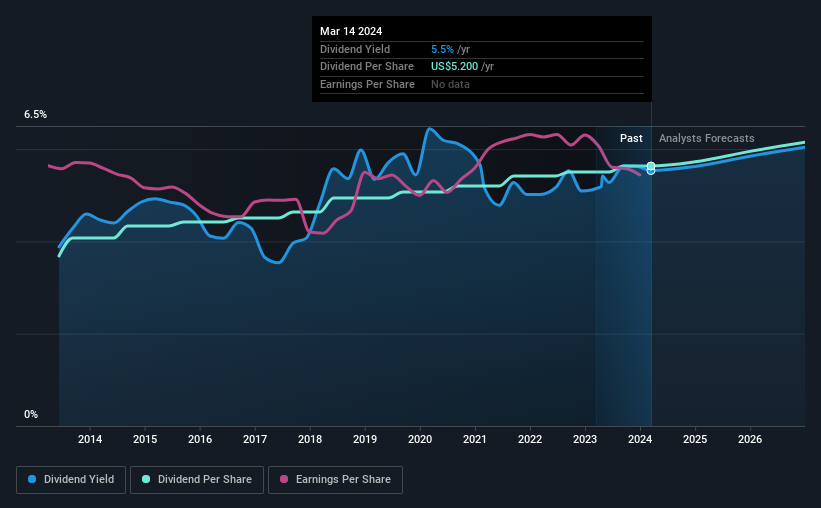Stock Analysis
- United States
- /
- Tobacco
- /
- NYSE:PM
Don't Race Out To Buy Philip Morris International Inc. (NYSE:PM) Just Because It's Going Ex-Dividend

Philip Morris International Inc. (NYSE:PM) is about to trade ex-dividend in the next four days. Typically, the ex-dividend date is one business day before the record date which is the date on which a company determines the shareholders eligible to receive a dividend. The ex-dividend date is important as the process of settlement involves two full business days. So if you miss that date, you would not show up on the company's books on the record date. Accordingly, Philip Morris International investors that purchase the stock on or after the 20th of March will not receive the dividend, which will be paid on the 9th of April.
The company's next dividend payment will be US$1.30 per share, and in the last 12 months, the company paid a total of US$5.20 per share. Based on the last year's worth of payments, Philip Morris International stock has a trailing yield of around 5.5% on the current share price of US$93.95. We love seeing companies pay a dividend, but it's also important to be sure that laying the golden eggs isn't going to kill our golden goose! So we need to check whether the dividend payments are covered, and if earnings are growing.
Check out our latest analysis for Philip Morris International
If a company pays out more in dividends than it earned, then the dividend might become unsustainable - hardly an ideal situation. Last year Philip Morris International paid out 102% of its profits as dividends to shareholders, suggesting the dividend is not well covered by earnings. Yet cash flows are even more important than profits for assessing a dividend, so we need to see if the company generated enough cash to pay its distribution. The company paid out 101% of its free cash flow over the last year, which we think is outside the ideal range for most businesses. Cash flows are usually much more volatile than earnings, so this could be a temporary effect - but we'd generally want to look more closely here.
As Philip Morris International's dividend was not well covered by either earnings or cash flow, we would be concerned that this dividend could be at risk over the long term.
Click here to see the company's payout ratio, plus analyst estimates of its future dividends.

Have Earnings And Dividends Been Growing?
Stocks with flat earnings can still be attractive dividend payers, but it is important to be more conservative with your approach and demand a greater margin for safety when it comes to dividend sustainability. If business enters a downturn and the dividend is cut, the company could see its value fall precipitously. With that in mind, we're not enthused to see that Philip Morris International's earnings per share have remained effectively flat over the past five years. We'd take that over an earnings decline any day, but in the long run, the best dividend stocks all grow their earnings per share.
The main way most investors will assess a company's dividend prospects is by checking the historical rate of dividend growth. Philip Morris International has delivered an average of 4.3% per year annual increase in its dividend, based on the past 10 years of dividend payments.
Final Takeaway
From a dividend perspective, should investors buy or avoid Philip Morris International? Not only are earnings per share flat, but Philip Morris International is paying out an uncomfortably high percentage of both its earnings and cashflow to shareholders as dividends. It's not an attractive combination from a dividend perspective, and we're inclined to pass on this one for the time being.
Although, if you're still interested in Philip Morris International and want to know more, you'll find it very useful to know what risks this stock faces. We've identified 3 warning signs with Philip Morris International (at least 2 which don't sit too well with us), and understanding them should be part of your investment process.
Generally, we wouldn't recommend just buying the first dividend stock you see. Here's a curated list of interesting stocks that are strong dividend payers.
Valuation is complex, but we're helping make it simple.
Find out whether Philip Morris International is potentially over or undervalued by checking out our comprehensive analysis, which includes fair value estimates, risks and warnings, dividends, insider transactions and financial health.
View the Free AnalysisHave feedback on this article? Concerned about the content? Get in touch with us directly. Alternatively, email editorial-team (at) simplywallst.com.
This article by Simply Wall St is general in nature. We provide commentary based on historical data and analyst forecasts only using an unbiased methodology and our articles are not intended to be financial advice. It does not constitute a recommendation to buy or sell any stock, and does not take account of your objectives, or your financial situation. We aim to bring you long-term focused analysis driven by fundamental data. Note that our analysis may not factor in the latest price-sensitive company announcements or qualitative material. Simply Wall St has no position in any stocks mentioned.
About NYSE:PM
Philip Morris International
Philip Morris International Inc. operates as a tobacco company working to delivers a smoke-free future and evolving portfolio for the long-term to include products outside of the tobacco and nicotine sector.
Average dividend payer and fair value.

